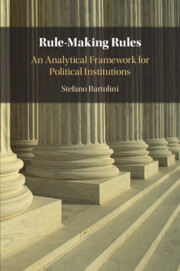
-
Select format
-
- Publisher:
- Cambridge University Press
- Publication date:
- 16 June 2022
- 30 June 2022
- ISBN:
- 9781009206303
- 9781009206273
- 9781009206280
- Dimensions:
- (229 x 152 mm)
- Weight & Pages:
- 0.6kg, 314 Pages
- Dimensions:
- (229 x 152 mm)
- Weight & Pages:
- 0.46kg, 313 Pages
- Subjects:
- Political Sociology, Politics and International Relations, Comparative Politics, Sociology
You may already have access via personal or institutional login- Subjects:
- Political Sociology, Politics and International Relations, Comparative Politics, Sociology
Book description
Stefano Bartolini argues that, despite the growth of a large theoretical literature about institutions and institutionalism over the last thirty years, the specific nature of political institutions has been relatively neglected. Political institutions have been subsumed into the broader problems of the emergence, persistence, change and functions of all types of institutions. The author defines political institutions strictly as norms and rules of 'conferral', to be distinguished from norms/rules of 'conduct' and of 'recognition'. They are those norms and rules that empower rulers, set limits to the capacity to ensure behavioural compliance, and define the proper means for achieving such compliance. This book draws logical and empirical consequences from this understanding, to distinguish different types of norms/rules, and to specify the peculiarities of those norms/rules that are 'political'. The book will appeal to researchers of political institutions in comparative politics, and in political science and political sociology more broadly.
Reviews
‘With sweeping historical reference and discerning judgment, Stefano Bartolini takes on one of the central problems of contemporary social science, namely, how we should understand ‘institutions’, with a view to establishing what is distinctive about political institutions. This is a book full of insights from which everyone who wants to understand the role of institutions in political life can learn.’
Peter A. Hall - Krupp Foundation Professor of European Studies, Harvard University
‘Rule-Making Rules makes an invaluable contribution to the old European tradition of placing institutions at the core of political life. Bartolini is courageous in terms of his time perspective and the number of disciplines covered, and he presents an analytical framework making a clear distinction between political institutions, and their ordering of human coexistence, and other institutions.’
Johan P. Olsen - Professor emeritus and founding director of Center for European Studies, University of Oslo, Norway
Contents
Metrics
Altmetric attention score
Full text views
Full text views help Loading metrics...
Loading metrics...
* Views captured on Cambridge Core between #date#. This data will be updated every 24 hours.
Usage data cannot currently be displayed.
Accessibility standard: Unknown
Why this information is here
This section outlines the accessibility features of this content - including support for screen readers, full keyboard navigation and high-contrast display options. This may not be relevant for you.
Accessibility Information
Accessibility compliance for the PDF of this book is currently unknown and may be updated in the future.


